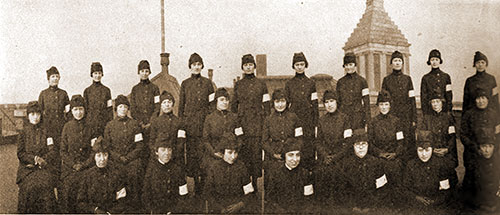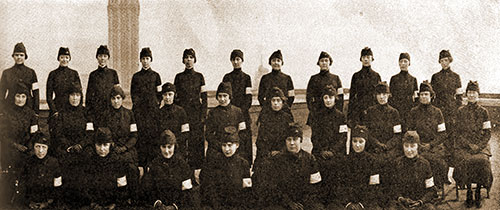Seventh Unit of Telephone Operators Demobilizes - 1919
Members of the Seventh Unit, who received instruction at various training points throughout the country, including San Francisco, Chicago, Milwaukee, New York, Philadelphia, Scranton, Trenton, Camp Dix, Atlantic City, New Haven, and Hartford. The group also includes nine operators trained by the Eastern Traffic Association at Philadelphia, the United Telephone Company at Lancaster, Pa., the York Telephone Company at York, Pa., and the Johnstown Telephone Company at Johnstown.

Left Side of Panoramic Group Photograph, Seventh Unit of Telephone Operators of the Signal Corps. The Telephone Review, January 1919. GGA Image ID # 19850f1d1c

Right Side of Panoramic Group Photograph, Seventh Unit of Telephone Operators of the Signal Corps. The Telephone Review, January 1919. GGA Image ID # 1985395d7b
Names of Telephone Operators (Left and Right Side of Panoramic Image)
Left to Right, Front Row: 1. Miss Enid A. Mack, Seattle, WA.; 2. Miss Alice Langellier, Chicago, IL.; 3. Miss Elizabeth F. Thorne, West Brighton, SI; 4. Mi__urelie C. Asten, Leonia, NJ; 5. Miss Eugenia Thomann, Philadelphia, PA; 6. Miss Jeanne Poutz-Nogues, Philadelphia, PA; 7. Miss Marie Hess, Philadelphia, PA; 8. Miss Marearet S. Wilson. Williamsport, PA; 9. Miss Ethel C. Elkins, Philadelphia, PA; 10. Miss Satie M. Brown, Traverse City, MI; 11. Miss Marie teen, Brooklyn, NY; 12. Miss Margaret Whalen, Montreal, PQ; 13. Miss Marguerite Blanchet, San Francisco, CA; 14. Miss Lena Roy, Bozeman, MT.
Left to Right, Middle Row: 1. Miss Gabrielle Toby, New York, NY; 2. Miss Helene Toby. Roslyn, LI; 3. Miss Gilda B. Coulern. New York, NY; 4. Miss Marguerite ________s, Chicago, IL.; 5. Miss Marguerite Monnet, Chicago, IL; 6. Miss Helen Tememe, San Francisco, CA; 7. Miss Mathilde Ferrie, San Francisco, CA; 8. Miss Elsa Freeman, Chicago, IL; 9. Miss Marguerite De Saulles, New York, NY; 10. Miss Helene Champrigand, New York, NY; 11. Miss Ruthe Clarke, Portland. OR; 12 Miss Emma A. Lundell, Poughkeepsie, NY; 13. Miss Alice M. Cazasus, San Francisco, CA; 14. Miss Thelma Miller, Seattle, WA; 15. Miss Marie D. James, Philadelphia, PA; 16. Miss Cecile Joncas, Chicago, IL; 17. Miss Yvonne R. Haas. Wauconda, IL; 18. Miss Alisse Lambert, Chicago, IL; 19. Miss Frances L. Si_____ in. Chicago, IL.; 20. Miss Elizabeth M. Chesbrough, Chicago, IL.
Left to Right, Back Row: 1. Miss Marguerite E. Carpentier, Alameda. Cal.; 2. Miss Margaret O. Jones, Seattle, Wash.; 3. Miss Mary E. Mecredy, Berkeley, Cal.; 4. Miss Ma rite Ruddy, Wilkes-Barre, Pa.; 5. Miss Aurelie Hermitte, Philadelphia, Pa.; 6. Miss Berthe “Brunei, Logan, Pa.; 7. Miss Sophie T. Lefebvre, Watertown, N. Y.; 8. Mrs. Nancy D. Baines, Canandaigua, N. Y.; 9. Miss Anne H. Spencer, Philadelphia, Pa.; 10. Miss Marie G. Rennick, Springfield, Ill.; 11. Miss Anita Brown. La geles. Cal.; 12. Miss Gertrude Zohrlaut, Milwaukee, Wis.; 13. Miss Elise Montgomery, New Haven, Conn.; 14. Miss Mildred Wakefield, New Haven, Conn.; 15. Miss Ida P. Keen, Waterville, Me.; 16. Miss Catherine Français, Jenkintown, Pa.; 17. Miss Marie D. Lenglet, Springfield, 111.; 18. Miss Olive L. Creelman. Ch Ill.; 19. Miss Dorothy E. Dunbar, Chicago. Ill.; 20. Miss Dorothea E. Walker, Atlantic City, N. J.; 21. Miss Gwendolyn Green, Seattle, Wash.
The Story About the Seventh Unit
On “Armistice Day’' a soldier boy was walking along glumly in the midst of the wild celebration, when a girl who was passing poked a flag in front of him, and asked, “Why don’t you smile?” “I didn’t get over,” was the reply.
The Seventh Unit of telephone operators “didn’t get over” either, and great was the disappointment of its members. Can you imagine their situation? On October 26 they had been turned over to the officer of embarkation, and on November 1, their trunks and baggage were put on board the steamer Patria.
The group was headed by Miss Emma A. Lundell, Supervisor, with the following operators in charge: Miss Anita Brown, Mrs. Nancy D. Baines, Supervisor, Miss Mildred Wakefield, Miss Elsie Montgomery, and Miss Ida P. Keen.
But “there’s many a slip ’twixt the cup and the lip,” and orders came that the ship would not sail. However, though their luggage was returned to them, they kept up hope that they would be needed, and awaited their order to embark from day to day, hoping against hope that it would come.
Until December the girls were quartered at the Prince George Hotel, but when the Government took them under its wing, they were transferred to the Madison Square Hotel, where they were put up in suites, —four girls to each one.
They cannot go abroad, but, as the boys query, “Are they down-hearted?” No, indeed. Far from it. They feel that they are fortunate in knowing before sailing that they would not be needed. To go has been their one ambition for the past six months, and as long as that ambition is not to be gratified, they are content to stay and follow their various professions and lines of work.
Their little silver service stripe represents much to them of interest and experience. In all probability there is not a girl in the unit who does not look back with satisfaction upon her six months’ intensive training for overseas telephone service. From February to June the members of the Seventh Unit were engaged with the intricacies of local operating. They were just ready to sail for France when orders were received to the effect that no more local operators were needed, so their training was continued, this time for long distance.
Few of these operators had had any telephone experience previous to their period of training. They spoke the French language very fluently and were selected with that as the chief requirement. As in the other groups, these girls were drawn from various professions, and were entering the service from purely patriotic motives.
In addition to their regular training, these operators had the advantage of two weeks’ study of advanced long distance operating under the direction of Mrs. Kortepeter, supervisor of instruction, who had much to do with correlating the work of the many groups that made up the units that went to France.
Treated Like Soldiers
There were other features besides operating that went to make up the web of their work while in training. One was the drilling that took place regularly at the Sixty-ninth Regiment Armory, under the guidance and instruction of Lieutenant O’Connor, who had the unit in charge. Both he and they were extremely proud of the way in which the girls learned to execute the various military maneuvers, in which, from all reports, they attained a high degree of proficiency.
Another thing of which the girls are very appreciative, is the effort of various organizations to entertain them and make them happy. The Theatrical Assembly and other organizations provided them with diversions, such as concerts, dances at the Imperial Hotel, half-rate theatre tickets, et cetera, and they were accorded the canteen privileges similar to those given to soldiers and sailors.
The newspapers are full of the topic “Demobilization and Reconstruction,” and their readers wonder daily as to just what the returning army and navy men will do when they leave the service. In the demobilization of the telephone unit it is interesting to note the paths chosen by the members.
Some of them might be listed among those women who had never before been in business, —whose time had been previously occupied with social activities, and with travel. When the call came for women to share the war’s burden, they stepped forth to do their duty to their country, and have been amply rewarded by gaining a new insight into life.
In fact, some of them have become so wrapped up in telephone work that they feel they can never again return to idleness. Others who were drawn from various professions feel that in telephone operating they have found their niche and have decided to continue their activity in the telephone business.
Still others have become enamored of New York, and intend to pursue their formet professions in it, instead of returning to their own towns and cities. “Tales could be told,” it is said, of others who confess themselves ready to “marry and settle down” in New York. Who they are remains to be seen.
A Woman’s Profession
It seems that telephone operating is essentially a woman’s profession, for it furnishes an infinite variety and scope for her powers. Without being mechanical, it requires skill and concentration, —dexterity of both fingers and mind.
The girl at the keyboard has at her fingertips the pulsing of the great heart of a city, and with her lies the power to bind together these cities, towns, and rural districts stretching from one side of the continent to the other.
Then, too, there is the instruction work connected with the science of telephone operating, —a phase of the work that appeals to many. In selecting applicants, gauging their aptitude for operating, teaching them the principles and practice of operating, and making them happy and comfortable, many of these demobilizing operators feel that they would be doing tasks for which they are especially well fitted.
They are interested in the human side of the work, and in telephone work especially, where so much depends on the girl herself, the human equation looms large.
So it is, that the telephone operators who trained so faithfully and so untiringly to supplement the splendid work of the other six units already overseas, view the situation philosophically. and have decided that, after all, they gained a great deal and lost little by their experience and declare themselves ready to take up their civilian work once again with renewed energy, and a fresh viewpoint on life.
"Seventh Unit of Telephone Operators Demobilizes," in The Telephone Review, Vol. 10, No. 1, Janary 1919, pp. 12-13.
